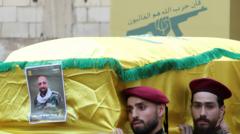The United States has vetoed a United Nations Security Council resolution calling for an immediate cease-fire in Gaza, reflecting deepening tensions in the region.
U.S. Blocks UN Cease-Fire Resolution Amid Growing Gaza Crisis

U.S. Blocks UN Cease-Fire Resolution Amid Growing Gaza Crisis
The U.S. vetoes a cease-fire resolution at the UN Security Council, citing hostage release conditions in the ongoing Gaza conflict.
The U.S. has once again vetoed a United Nations Security Council resolution aimed at establishing an immediate and unconditional cease-fire in Gaza, where conflict has reached a critical level as it enters its 14th month. This latest veto, supported by only the United States, comes in the context of escalating humanitarian crises, with local health authorities reporting over 40,000 fatalities in Gaza since the outbreak of war.
The resolution garnered backing from 14 members of the Council; however, the U.S. maintained its position that a cease-fire should not be enacted without securing the release of hostages taken by Hamas. U.S. Ambassador to the UN, Robert A. Wood, stated, “We could not support an unconditional cease-fire that failed to release the hostages. These two urgent goals are inexplicably linked.” This was the U.S.'s fourth veto concerning cease-fire initiatives since the conflict escalated after Hamas's attack on Israel over a year ago which resulted in more than 200 hostages being taken.
As military actions continue and humanitarian conditions worsen, the U.S. government is actively pursuing negotiations aimed at establishing a cease-fire and facilitating hostage releases. However, this veto highlights the complexities involved in reconciling humanitarian needs with security considerations. The ramifications of this decision extend beyond the immediate crisis, affecting international relations and diplomatic efforts in the region moving forward.
The resolution garnered backing from 14 members of the Council; however, the U.S. maintained its position that a cease-fire should not be enacted without securing the release of hostages taken by Hamas. U.S. Ambassador to the UN, Robert A. Wood, stated, “We could not support an unconditional cease-fire that failed to release the hostages. These two urgent goals are inexplicably linked.” This was the U.S.'s fourth veto concerning cease-fire initiatives since the conflict escalated after Hamas's attack on Israel over a year ago which resulted in more than 200 hostages being taken.
As military actions continue and humanitarian conditions worsen, the U.S. government is actively pursuing negotiations aimed at establishing a cease-fire and facilitating hostage releases. However, this veto highlights the complexities involved in reconciling humanitarian needs with security considerations. The ramifications of this decision extend beyond the immediate crisis, affecting international relations and diplomatic efforts in the region moving forward.




















